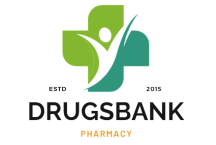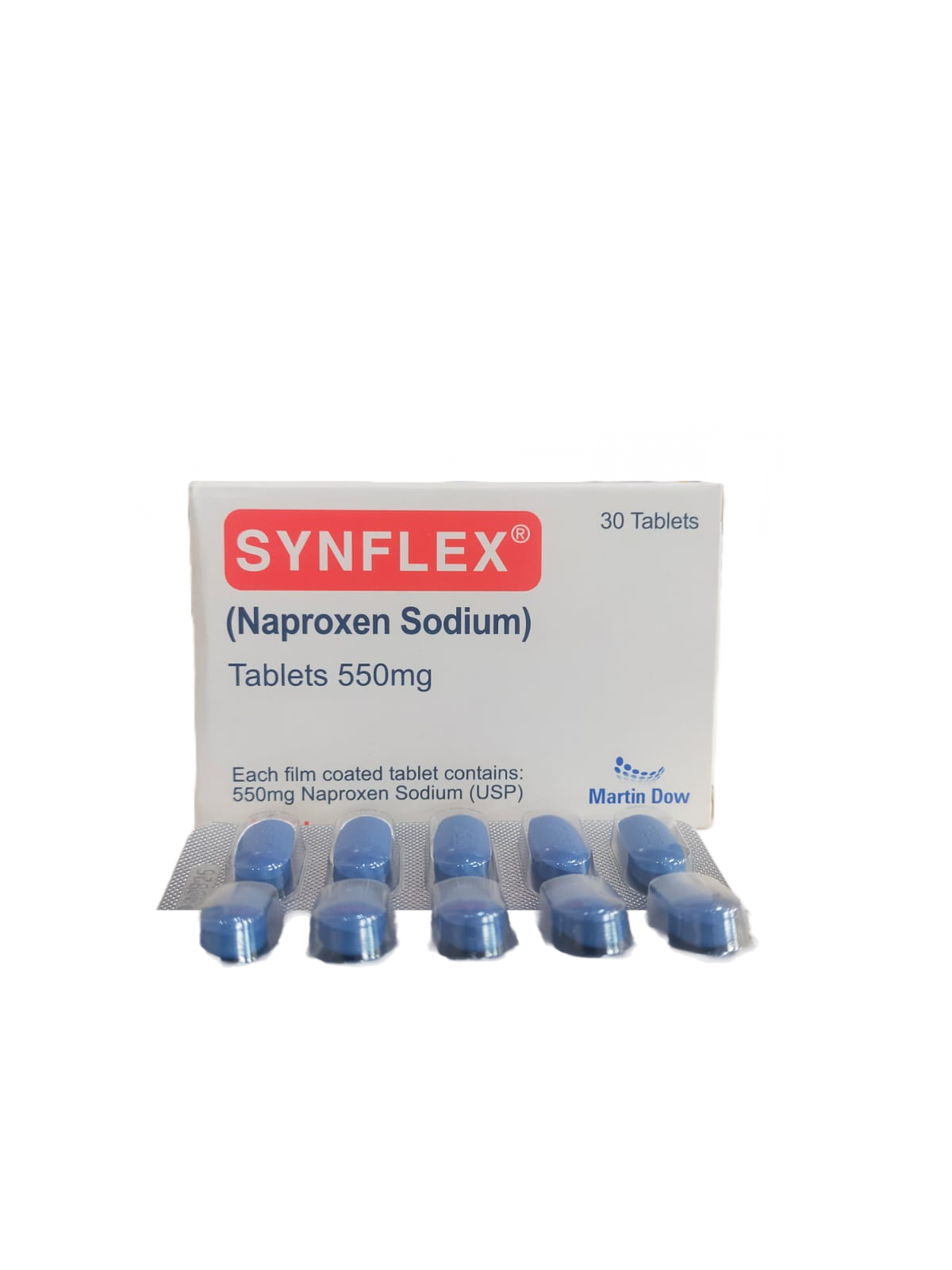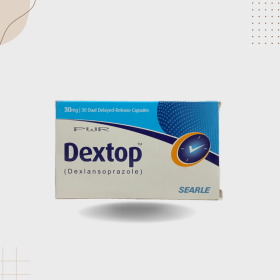Synflex Tablet is a medicine brand containing Naproxen as the active ingredient. This article provides a medical perspective on the uses, mechanisms of action, dosages, and safety considerations associated with Synflex Tablets.
Composition
Each Synflex Tablet contains 550mg of Naproxen, which belongs to the class of NSAIDs (Nonsteroidal Anti-Inflammatory Drugs).
Mechanism of Action
Naproxen in Synflex Tablets works by inhibiting the production of inflammatory mediators in the body. This action reduces pain and inflammation, making it a valuable tool for pain management.
Synflex Tablet Uses
Synflex Tablets are indicated for various conditions, including but not limited to:
- Musculoskeletal disorders (e.g., gout, rheumatoid arthritis)
- Headaches and migraines
- Menstrual cramps
- Inflammatory pain conditions
Synflex Dosage and Administration
- Swallow Synflex Tablets whole with a glass of water.
- Do not crush or chew the tablets.
- Consume them with food to reduce the risk of stomach irritation.
- If gastrointestinal discomfort or nausea occurs, consult a healthcare provider.
- Synflex Tablets are meant for short-term use, and the lowest effective dose should be used.
Safety Considerations
It is crucial to be aware of potential risks and warnings associated with Synflex Tablets, including:
- Pregnancy and Breastfeeding: Consult a healthcare provider before using during these periods.
- Allergic Reactions: Be vigilant for signs of allergies, ranging from mild itching to severe anaphylaxis.
- Preexisting Conditions: Caution is advised for individuals with heart conditions, hypertension, gastric ulcers, bleeding disorders, kidney disease, asthma, or liver diseases.
Possible Side Effects
Synflex Tablets may lead to side effects, such as;
- Abdominal pain,
- Vomiting containing coffee ground-like material,
- Blood in stool,
- Constipation,
- Black stools,
- Acid reflux.
- Patients should promptly report any of these to their healthcare provider.
Drug Interactions
Naproxen, the active ingredient in Synflex, is a nonsteroidal anti-inflammatory drug (NSAID) that can interact with various other medications. Understanding these interactions is vital for ensuring patient safety and the effectiveness of treatment. Here, we delve into the specifics of these interactions:
- Antidepressant Drugs: Combining selective serotonin reuptake inhibitors (SSRIs) with Naproxen, as found in Synflex, can increase the risk of gastrointestinal bleeding. Some common SSRIs include citalopram, fluoxetine, fluvoxamine, and paroxetine.
- Blood Pressure Medications: Naproxen may reduce the effectiveness of certain blood pressure medications, particularly in individuals over 65. These medications include angiotensin-converting enzyme inhibitors like lisinopril, angiotensin II receptor blockers such as valsartan and losartan, beta-blockers like propranolol, and diuretics like hydrochlorothiazide and furosemide (Lasix).
- Heartburn and Stomach-Protecting Drugs: Concomitant use of Naproxen with certain medications intended to reduce stomach acid or protect the stomach lining can slow down the absorption of Naproxen. These medications include aluminum hydroxide, magnesium oxide, and sucralfate.
- Other NSAIDs: Combining Naproxen with other NSAIDs, such as aspirin, ibuprofen, diclofenac, ketorolac, and others, can significantly increase the risk of gastrointestinal bleeding.
- Cholestyramine: Cholestyramine can slow down the absorption of Naproxen, meaning it may take longer for Naproxen to start working when combined with cholestyramine.
- Lithium: Combining Naproxen with lithium can increase lithium levels in the body to potentially harmful levels. Monitoring lithium levels is crucial in such cases.
- Methotrexate: Taking methotrexate with Naproxen can lead to elevated levels of methotrexate in the body, potentially causing harmful side effects. Close monitoring is essential.
- Warfarin: Combining warfarin with Naproxen increases the risk of gastrointestinal bleeding, which can be severe. Regular monitoring of blood clotting parameters is recommended in these cases.
To avoid these interactions, patients should always provide their healthcare provider with a comprehensive medical history, including all medications, supplements, and over-the-counter drugs they are taking. Healthcare providers can then make informed decisions about using Naproxen and adjust treatment plans to ensure patient safety and efficacy. Patients should never change their medication regimen or stop taking prescribed drugs without consulting their healthcare provider.
Exploring Alternatives
In case Synflex Tablets are not suitable, alternative medications;
- Naprosyn: Naprosyn is a nonsteroidal anti-inflammatory drug (NSAID) commonly used to relieve pain and inflammation. It’s an effective choice for various conditions, including arthritis and muscle aches.
- Neoprox: Neoprox, similar to Naprosyn, belongs to the NSAID category and is often prescribed to manage pain and reduce inflammation, making it a suitable alternative for individuals seeking relief.
- Proxen: Proxen is an NSAID that can help alleviate pain and inflammation. It’s a well-regarded option for those with osteoarthritis and rheumatoid arthritis.
- Sumoxen: Sumoxen is another NSAID that provides pain relief and reduces inflammation. It can be a valuable alternative for individuals looking for effective pain management.
- Apranax: Apranax is an NSAID that relieves pain and inflammation, making it a potential substitute for Synflex Tablets in various situations, including post-surgery recovery and injury treatment.
Another painkiller brand is Berica Tablet, which contains Etoricoxib as an active ingredient.
Storage
Synflex Tablets should be kept out of the reach of children and stored at room temperature.
Frequently Asked Questions (FAQs)
- Is Naproxen 500mg a strong painkiller? Yes, it is a strong painkiller, but the strength of Naproxen varies among individuals.
- Do Synflex Tablets increase blood pressure? Monitoring blood pressure is essential, especially in individuals with hypertension.
- Are Synflex Tablets effective for body pain? Synflex Tablets are effective for a range of body pains.
- Can you drive while taking Synflex Tablets? Patients should assess their response to the medication, as it may affect their driving ability.
- What to do in case of overdose? Suspected overdoses should prompt immediate medical attention.
- Are Synflex Tablets safe during pregnancy and breastfeeding? Research suggests that it is not safe for pregnant and breastfeeding mothers. However, consultation with a healthcare provider is recommended during these phases.
Conclusion
Synflex Tablets, with Naproxen as the active ingredient, are a valuable tool for pain management in various conditions. However, patients should exercise caution, be aware of potential side effects, and consult their healthcare provider for personalized guidance.






Reviews
There are no reviews yet.